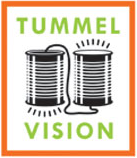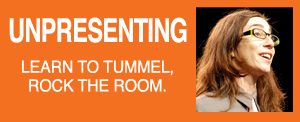Recent Episodes
TummelVision 42: Doc Searls on consumers, capitalism, and a decade of cluetraining
Podcast: Play in new window | Download
Episode Notes
The TummelVision gang visits with an old friend, Doc Searls, co-author of The Cluetrain Manifesto and a fellow at the Berkman Center for Internet & Society at Harvard University.
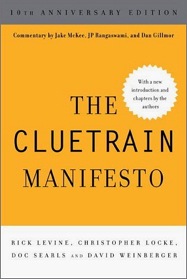
Some of the ideas, stories, and links mentioned in this episode:
The new “social web browser” RockMelt
Novelist Zadie Smith critiques social networks in the New York Review of Books
Intelligent responses to Zadie Smith from Alexis Madrigal and Ross Douthat
Doc on Walt Whitman
Randy Farmer on why “The Cake is a Lie” – Reputation, Facebook Apps, and “Consent” User Interfaces
Doc on the “Data Bubble”
The Wall Street Journal series on web privacy “What They Know”
A call for a new “Consumer Bill of Rights”
The Vendor Relationship Management Project wiki
Kevin Kelly on the Internet as an enormous copy machine
On the meaning of “trust” in digital parlance.
Be sure to follow Doc Searls on twitter and via his myriad projects.
Doc Searls on TummelVision Tonight
On Thursday, November 11, the TummelVision crew welcomes a special guest star, someone who’s worked on the web for a longtime as a leading advocate for customers advocating for themselves Doc Searls.
If you have a question for Doc, or suggestion for topics you’d like to hear discussed, please leave a comment below, tweet @TummelVision or #tummel, or email us at tummlers [at] gmail.com.
Please also join us for the live audio stream of this episode at 8 p.m. ET/ 5 p.m. PT on Thursday at Tummelvision.tv/Live. During these broadcasts (and “after parties”), be sure to check out our always-lively chat room.
As one of the authors of the seminal Cluetrain Manifesto, Doc Searls has been a tireless advocate for many of the ideals cherished by the Tummlers. Among many other current activities, he runs Project VRM as a fellow of the Berkman Center for Internet and Society at Harvard University. VRM stands for Vendor Relationship Management. Doc wants tools and platforms to allow people manage the way vendors (companies that sell you stuff and services) have relationships with them.
Doc’s very committed to a more humanized world, so how does tummeling fit into his vision for VRM? At what point do tummlers manage the relationship between customers and the company and when do business recognize they need tummelers to manage the company in a networked environment? How will the new VRM technologies work for real people doing this work? Or was the Cluetrain Manifesto a pipedream and a wish that peopel working for companies treat people as people?
Doc’s perspective is a rare blend of seasoned wisdom and up-to-the-minute expertise. We hope you’ll join us for this “very special episode” of TummelVision.
TummelVision 41: Josh Klein on Hacking Work
Podcast: Play in new window | Download
Episode Notes
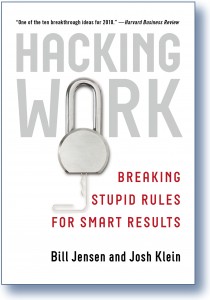 Josh Klein is a technologist, hacker, and rule-breaking innovator. With Bill Jensen, he’s the author of the new book Hacking Work: Breaking Stupid Rules for Smart Results. In this episode of Tummelvision, he talks with Heather, Kevin, and Deb about the book, dysfunctional workplaces, and fear-free workarounds in big corporations.
Josh Klein is a technologist, hacker, and rule-breaking innovator. With Bill Jensen, he’s the author of the new book Hacking Work: Breaking Stupid Rules for Smart Results. In this episode of Tummelvision, he talks with Heather, Kevin, and Deb about the book, dysfunctional workplaces, and fear-free workarounds in big corporations.
Why Self-Organized Networks Will Destroy Hierarchies
The people in authority who make the rules interfere with the people who know how to do the job and are in direct contact with the situation. The people who make the rules know nothing about the work they’re interfering with.
-Kevin Carson, Why Self-Organized Networks Will Destroy Hierarchies
Kevin’s post give me food for thought. It’s my preference not to abstract the hierarchy / network thing into information but view it as people problems or challenges. Tummeling is a kind of human self-networking that happens even within hierarchies. Many corporations function because there are individuals who take it upon themselves to make connections and bring people together across “silos” (man I hate that word). Sometimes it’s an admin assistant or project manager or someone with low “authority status” (something else Carson’s post critiques, the mistake hierarchy managers make when they look to what they see as authority rather than actual experience).
What’s most important to me about what Carson refers to as “people who know how to do the work” is not their abstract knowledge but what is experiential. Experience happens in the present. It’s where all real authority and creativity emerges.
Tummeling with Geeks
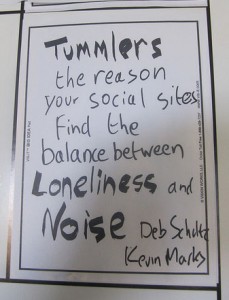 Part of our passion surrounding Tummelvision is stems from our desire to explore and highlight the dynamics of what is needed to create engaged social spaces online. Kevin and Deb led a session at the recent O’reilly Open Web Foo Camp where we intro’ed the concept to our beloved geek community. We had a great discussion with a number of folks including Dale Dougherty [who runs the world of Make], Sarah Novotny [program chair of OSCON] and others. As Tummlers themselves – they commented on the need for better tools for curators, creators and catalysts to help them connect with their community and for their community to connect with each other.
Part of our passion surrounding Tummelvision is stems from our desire to explore and highlight the dynamics of what is needed to create engaged social spaces online. Kevin and Deb led a session at the recent O’reilly Open Web Foo Camp where we intro’ed the concept to our beloved geek community. We had a great discussion with a number of folks including Dale Dougherty [who runs the world of Make], Sarah Novotny [program chair of OSCON] and others. As Tummlers themselves – they commented on the need for better tools for curators, creators and catalysts to help them connect with their community and for their community to connect with each other.
The intersection of our human selves and tech were popping up in many conversations and many sessions throughout the weekend. We are definitely at a unique moment – where the once binary web is just starting to recognize the need to evolve into a more organic entity that better reflects who we are and how we behave – a more reflective representation of our offline selves. Let’s face it, we take ourselves with us wherever we are. In one of the sessions led by Brady Forrest we discussed the need for Social Bots – sounds scary – but really it could potentially be about making us smarter about ourselves and our interactions – these bots could help us maintain our social relationships across many groups, sites, and tribes. They could even be a personal data stream to report back to me analytics about my life in meaningful ways. But therein lies the rub – as soon as we start heading down the “manage my life” track – it starts getting complex very quickly. We need to ensure that in our effort to create a more open web we provide for the likelihood of ever changing connections and the ability to set permissions and identity as we choose.
As both Elizabeth Churchill [Ep 7 Guest] and Shelly Farnham pointed out, not all of us want 100% transparency all the time. This leads us into many complex and complicated issues of privacy, identity, control, permissions etc. We are seeing them played out daily – everywhere – and though computers can do a better job of helping us filter and manage some of these complexities it will ultimately be up to us – the humans and the Tummlers to make it all work seamlessly and organically. The human brain and heart – are still the best at managing the nuances of our social selves.
